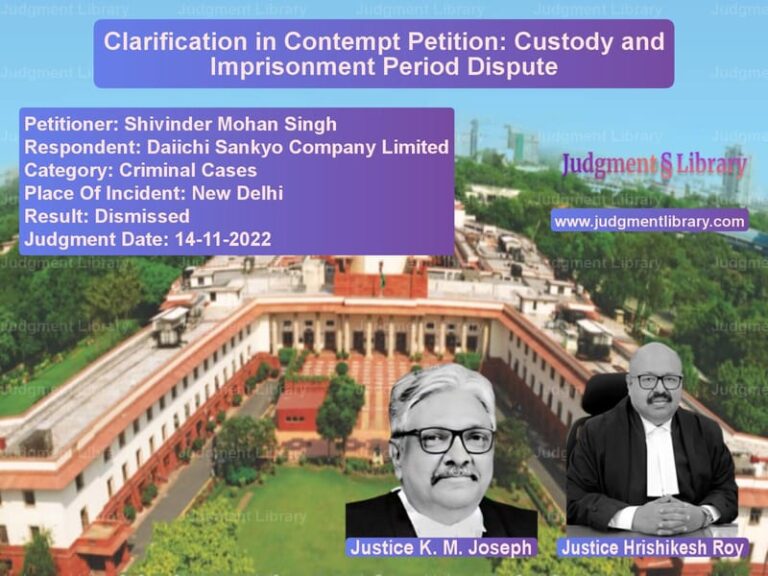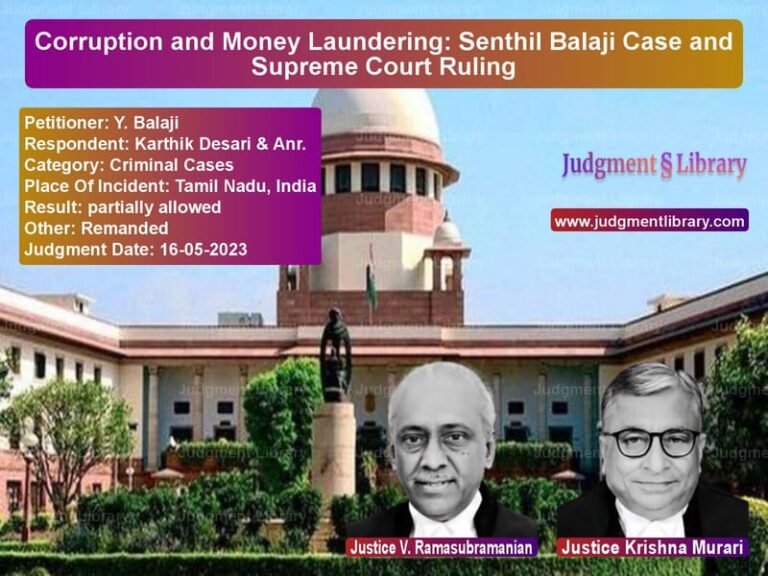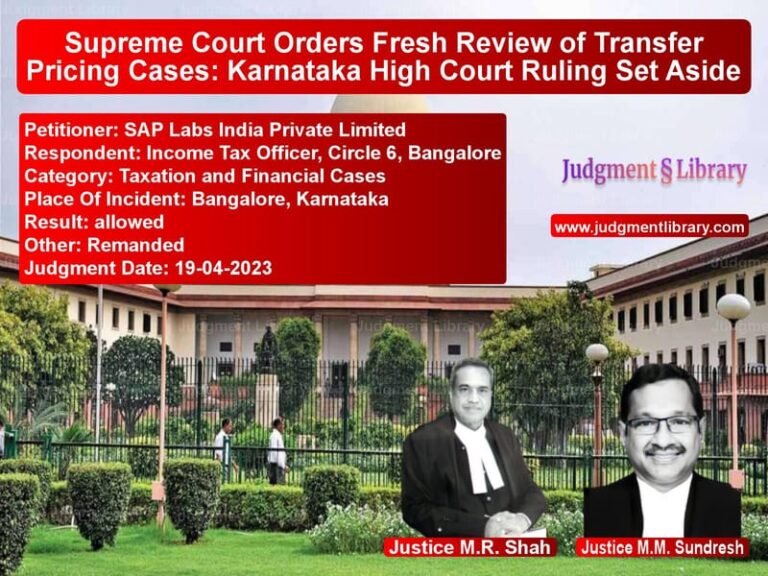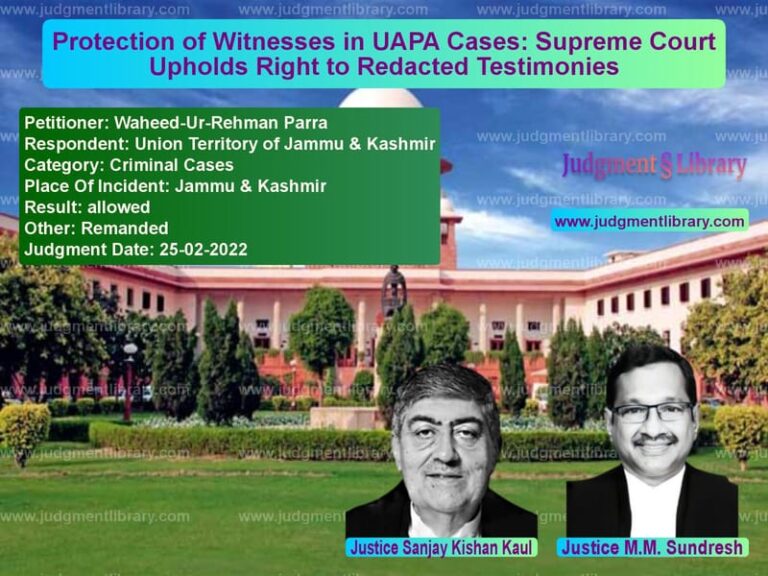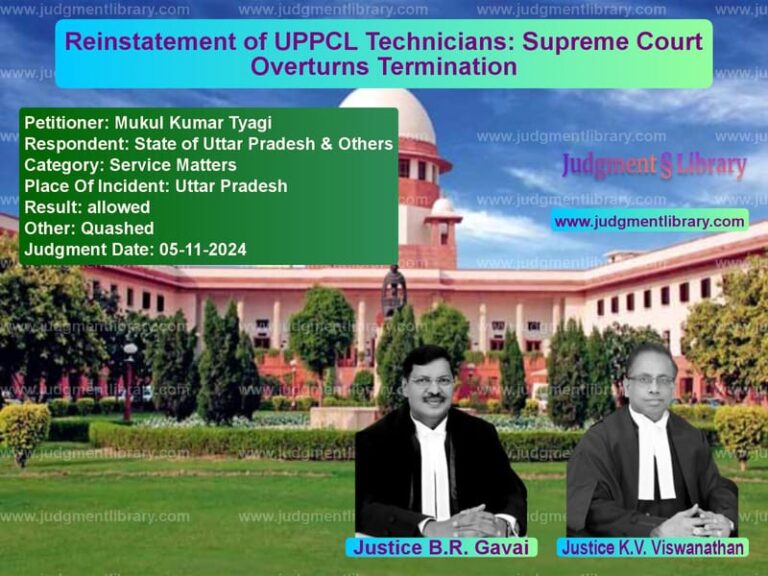Murder Acquittal Upheld: Supreme Court Rejects Odisha Government’s Appeal
The Supreme Court of India recently ruled in the case of The State of Odisha vs. Banabihari Mohapatra & Another, dismissing the state government’s appeal against the acquittal of two accused in a murder case. The Court held that mere suspicion cannot substitute for proof beyond reasonable doubt and reaffirmed the presumption of innocence in favor of the accused.
Background of the Case
The case arose from the alleged murder of Bijay Kumar Tadu, a home guard posted at Chandabali Police Station, Odisha. His wife, the complainant, filed an FIR alleging that her husband was murdered by the accused persons—Banabihari Mohapatra and his son Luja alias Smruti Ranjan Mohapatra. The complainant claimed:
- The deceased was last seen in the company of the accused on the night of June 22, 2014.
- The next morning, the accused informed the complainant that the deceased was lying motionless.
- The body was found locked inside a shop owned by the accused, with burn injuries suggesting electrocution.
- The deceased was carrying money and jewelry, which were missing from the body.
- The accused had a financial dispute with the deceased over a loan of ₹20,000.
The Sessions Court of Bhadrak acquitted the accused on January 14, 2020, citing lack of conclusive evidence. The Orissa High Court subsequently dismissed the state’s appeal due to a delay of 41 days in filing, along with insufficient grounds to overturn the acquittal.
Petitioner’s (State of Odisha) Arguments
The Odisha government, challenging the acquittal, argued:
- The High Court erred in dismissing the appeal solely on the ground of delay.
- The circumstantial evidence strongly pointed to the guilt of the accused.
- The accused had motive, as they owed money to the deceased and were the last persons seen with him.
- The deceased’s body was found locked inside their premises, indicating foul play.
Respondent’s (Accused) Arguments
The defense countered:
- The prosecution failed to establish direct evidence linking them to the crime.
- The post-mortem report suggested electrocution but did not confirm homicide.
- The complainant introduced the financial dispute claim as an afterthought, as it was absent from the initial FIR.
- They voluntarily informed the complainant about the deceased’s condition, showing they had nothing to hide.
Supreme Court’s Observations
The Supreme Court, comprising Justices Indira Banerjee and Hemant Gupta, upheld the acquittal and made the following key observations:
- The prosecution relied solely on circumstantial evidence, which did not conclusively prove guilt.
- The post-mortem suggested death by electrocution but did not rule out accidental causes.
- “The mere fact that the deceased was lying dead at a room held by the accused does not establish that they murdered him.”
- The complainant’s financial dispute claim was not mentioned in the FIR, raising doubts about its credibility.
- Several prosecution witnesses turned hostile, weakening the case.
The Court reiterated:
“Suspicion, however strong, cannot take the place of proof. An accused is presumed innocent unless proven guilty beyond reasonable doubt.”
Final Judgment
The Supreme Court dismissed the state’s appeal, holding that:
- The High Court correctly dismissed the appeal, as there was no compelling reason to overturn the acquittal.
- In cases based on circumstantial evidence, the prosecution must establish an unbroken chain of events leading to the accused’s guilt.
- The benefit of the doubt must go to the accused, as the prosecution failed to rule out accidental death.
- The principles governing appeals against acquittals require strong reasons to overturn a lower court’s judgment, which were absent in this case.
Impact of the Judgment
This ruling has significant implications for criminal jurisprudence:
- Reaffirmation of Presumption of Innocence: The Court reinforced that acquitted persons should not be convicted unless compelling evidence emerges.
- Higher Burden of Proof in Circumstantial Cases: The ruling clarifies that mere suspicion is insufficient; the prosecution must establish guilt beyond doubt.
- Guidelines for Appeals Against Acquittals: The Court emphasized that appeals should be entertained only when there are glaring errors in the lower court’s judgment.
- Protection Against Delayed and Weak Prosecutions: The judgment discourages prolonged legal battles without strong evidence.
Conclusion
The Supreme Court’s ruling in The State of Odisha vs. Banabihari Mohapatra & Another reinforces the fundamental principles of criminal law. By dismissing the appeal, the Court upheld the principle that the burden of proof lies on the prosecution and that circumstantial evidence must establish guilt beyond a reasonable doubt.
Read also: https://judgmentlibrary.com/review-of-criminal-case-transfer-supreme-court-reinstates-delhi-trial/
This case serves as an important precedent, ensuring that courts do not convict individuals based on mere suspicion and that procedural fairness is maintained in criminal trials.
Petitioner Name: The State of Odisha.Respondent Name: Banabihari Mohapatra & Another.Judgment By: Justice Indira Banerjee, Justice Hemant Gupta.Place Of Incident: Bhadrak, Odisha.Judgment Date: 12-02-2021.
Don’t miss out on the full details! Download the complete judgment in PDF format below and gain valuable insights instantly!
Download Judgment: the-state-of-odisha-vs-banabihari-mohapatra-supreme-court-of-india-judgment-dated-12-02-2021.pdf
Directly Download Judgment: Directly download this Judgment
See all petitions in Murder Cases
See all petitions in Bail and Anticipatory Bail
See all petitions in Custodial Deaths and Police Misconduct
See all petitions in Judgment by Indira Banerjee
See all petitions in Judgment by Hemant Gupta
See all petitions in dismissed
See all petitions in supreme court of India judgments February 2021
See all petitions in 2021 judgments
See all posts in Criminal Cases Category
See all allowed petitions in Criminal Cases Category
See all Dismissed petitions in Criminal Cases Category
See all partially allowed petitions in Criminal Cases Category


